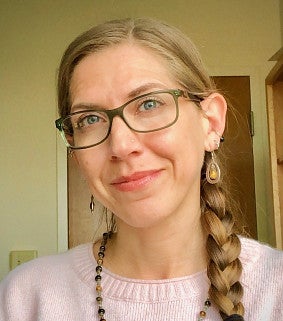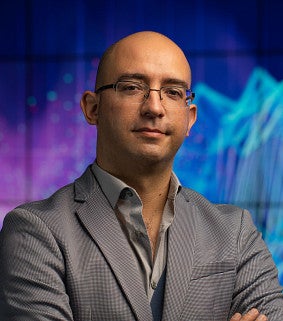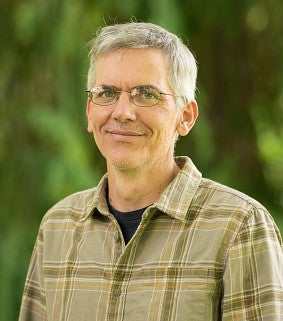Three University of Oregon professors in the College of Arts and Sciences have received teaching awards for their excellence in the classroom.
The annual Tykeson Teaching Awards are presented to one faculty member in each division of the UO’s largest college: the humanities, social sciences and natural sciences. The awards have been given out since 2015 and instructors are surprised in the middle of class by their colleagues and loved ones. The award comes with a $2,500 cash prize.
“In the College of Arts and Sciences, we are training students to be adaptable thinkers and leaders, who can deal with complexity and diversity and will make a positive impact, locally, nationally, and globally,” Dean Chris Poulsen said. “Each of the 2023 awardees — Assistant Professor Claire Herbert in the Department of Sociology, Senior Instructor and Head Undergraduate Advisor of Mathematics Hayden Harker, and Assistant Professor Ramón Alvarado in the Department of Philosophy — embody the spirit of our college, and I want to congratulate them for their dedication to the classroom.”

Applying class to real life
Claire Herbert was an undergraduate at the UO from 2002 to 2006. Though she was initially studying architecture, a class on the impacts of freeway construction for poor, minority communities sparked her interest in sociology. In 2019, she returned to her alma mater as a professor.
As winter term was drawing to a close this year, Herbert was surprised during her Sociology of Property class by her partner, her daughter, multiple divisional deans and fellow sociology colleagues.
“I was completely surprised and blown away,” Herbert said. “This is my first teaching award, and I thought it was really fun that they surprised me in the middle of class.”
Herbert learns a lot from her students and enjoys being able to see them apply class topics to their real lives. “It's super rewarding to have students tell you, ‘This thing we read in class sparked something else I'm going to go learn about,’” Herbert said. “It's so fun to see them grow and learn.”
Her passion for teaching arose from her father, a public school teacher who was loved by his students. His ability to view students as a whole person rather than just a seat in a classroom showed her the importance of making connections with students.
“My students are wonderful human beings who have something to offer the class and the world,” Herbert said. “And if we can support and promote that part of each other, that's a good way to be in the world.”

Forging thinkers
A bar and restaurant reserved for graduate students at McGill University in Montreal, Canada, was the start of Ramón Alvarado’s journey of becoming a philosopher.
While in high school, Alvarado would wait at the Thomson House for his sister to get off work, and he’d watch graduate students studying. It was an early exposure to higher education for the first-generation academic, one that would set him down the path of becoming a thinker, or in Spanish, “pensador.”
“We don’t call them intellectuals, we don’t call them scholars — we call them pensadores,” Alvarado said. “I was always baffled by those kinds of characters, because sometimes they were historians, sometimes they were poets, sometimes they were philosophers. In my head, I was like, whatever that is, that’s what I want to do. I want to think for a living.”
Alvarado received a Tykeson Teaching Award for developing PHIL 223 Data and Ethics, a course that is turning students into thinkers like him. The course is a requirement in the Data Science undergraduate program and teaches students to apply ethical questions in our increasingly automated world, from the use of social media to fairness of algorithms.
“Ethics is something that must be done by us. We cannot rely on just putting it in an algorithm,” he said. “You cannot escape ethics.”
During Alvarado’s time at the UO, he has inspired his students to use conceptual tools to be aware of bias and harm in technology and data.
“It’s really nice to hear students at the end of the course, especially non-philosophy students, who come and tell me, ‘I had never thought about this, and I will not forget about this,’” he said.

Unpacking math baggage
Hayden Harker received his PhD at UO in 2005. He became an instructor at UO in the fall of 2009. Harker always had mathematical prowess, but he had a natural inclination to teach, often tutoring his friends in high school.
Harker’s primary work is advising students all over campus with math questions about math courses, as well as advising math majors — that's about a third of his workload. The rest of his time is in the classroom working with students, writing lectures and teaching classes.
Harker was surprised when he saw faculty members and his wife walk into his lecture of 400 students. He soon put the pieces together that he was receiving a teaching award.
“It took me a moment to realize that people filing into the room were here to do something,” he said. “Then it dawned on me that it was one of those teaching awards!”
Harker explained that since he teaches mathematics, “one of the central challenges is that students often dislike mathematics and struggle with it.” For him, the biggest hurdle is figuring out "how one conveys to the students that they can struggle to understand something without judgment.”
Harker added, “There's a lot of baggage that students bring into the classroom with math. That’s why one of the biggest rewards of teaching classes is having students tell me that somebody told them to take my class.” Harker had a student last winter term whose brother took his class and said, “’You have to take a class from Hayden.’ In that way, I feel like I've succeeded in at least keeping a student engaged in the classroom throughout the course in a way they appreciated and felt valued.”
-by McKenzie Days, Henry Houston and Alyson Johnston, College of Arts and Sciences
